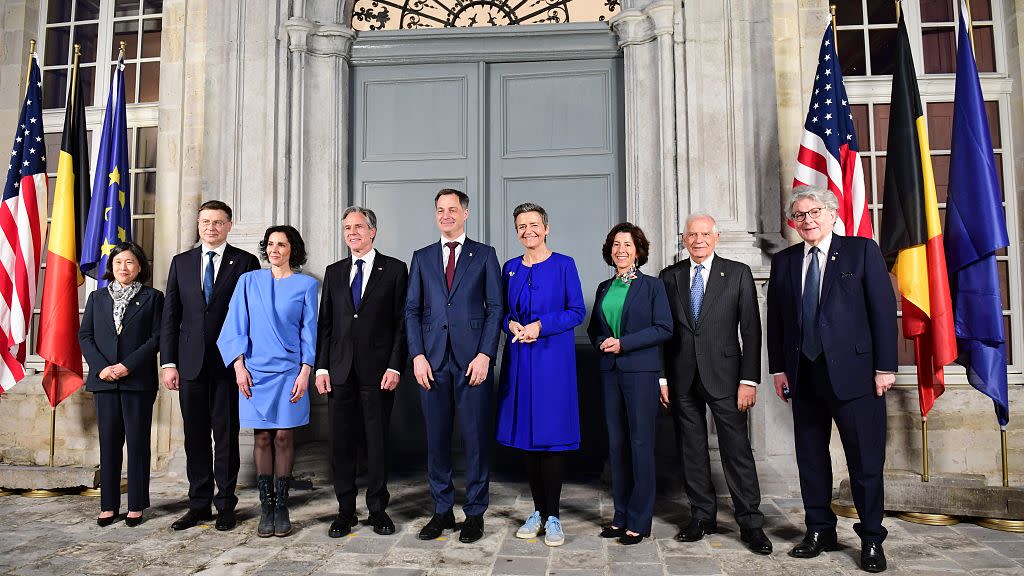China's shadow loomed over sixth EU-US Trade and Technology Council

- Oops!Something went wrong.Please try again later.
- Oops!Something went wrong.Please try again later.
- Oops!Something went wrong.Please try again later.
- Oops!Something went wrong.Please try again later.
A look back on a three-years dialogue
The two-day conflab saw digital, trade and internal market Commissioners - respectively Margrethe Vestager, Valdis Dombrovskis and Thierry Breton - meet US Secretaries of State and Commerce, Antony Blinken and Gina Raimondo, and Trade Representative Katherine Tai. They ruminated on what they considered positive outcomes arising from three years of technical working groups and biannual meetings - but no major new announcements emerged.
The EU and US confirmed that they are working on building a dialogue between the newly founded US AI Safety Institute and the EU AI Office to set benchmarks and draw red lines with a joint risk-based approach regarding Artificial Intelligence (AI) with the stated objective of making this technology safer.
Other vaunted successes include establishing joint research on 6G telecommunication and boosting digital skills of workers in response to AI.
“The TTC was invented because we had some difficulties communicating with your predecessors," said Breton, acknowledging that the TTC's greatest success was symbolic, in re-establishing relations with the US. The arrival of Joe Biden offered the EU an opportunity, and according to Breton: “We made something of it. We found the right channel to discuss and engage. We are the biggest and strongest allies on the planet.” The TTC has failed to deliver any memorable landmark initiatives, but it did help to halt escalating EU-US tariffs, and to rekindle cold dialogue.
This sixth and possibly final forum left some issues unresolved, however, that could hamper further rapprochement between the US and EU. These include outstanding tariffs on steel and aluminium imposed by the Trump administration, as well as Biden’s Inflation Reduction Act (IRA), a government subsidy that disadvantage European industries.
China: the ghost at the feast
Discussion of production of micro-chips inevitably involved consideration of China. Vestager stated in a press conference that “there is massive subsidisation by the Chinese government which could lead to market distortion”, justifying the increased cooperation in information sharing of the protection of the supply chain. Both the US and the EU have invested billions in counter measures - respectively through Chips Acts implemented by both blocs. Thierry Breton has claimed that by securing the supply chain, the US-EU worldwide semiconductor market share could reach 50% by 2030 from its current level of 8% - currently China exports most chips globally. However, for some the plan lacks cooperation.
While both blocs have welcomed rapid and coordinated imposition of sanctions imposed against Russia following its war on Ukraine, they are slow to acknowledge the extent to which China is replacing the Western actors in Russia, and the speed at which a rival axis has evolved. Since the beginning of the war, a “no limit partnership” and trade exchange between China and Russia has increased: the first taking advantage of low Russian oil prices, subject to sanctions in other countries (50% of Russian oil is exported to China) while the latter can access goods such as cars and smartphones that have become harder to find in Russia following the departure of the US and EU member states. Chinese customs data indicates Russia-China trade has jumped by almost two-thirds (64%) to the value of around €240bn in the last two years, and that China's share of the Russian market has surged from under 10% to over 50% in this period. “Our trade is well balanced, mutually complementary in high tech, energy, scientific research and development. It is very balanced," Vladimir Putin told US controversialist host Tucker Carlson in a recent interview.
Transatlantic trade, which accounts for 40% of global GDP and involves billions of dollars worth of goods traded daily, remains significantly higher than Sino-Russian trade. However, the latter is gradually closing the gap.
Russia's Foreign Minister Sergei Lavrov and China's Foreign Minister Wang Yi met in Beijing today (9 April) to discuss a security partnership and to jointly affirm opposition to "hegemonism and power politics [and] oppose the monopoly of international affairs by a few countries".
At EU level, mistrust of China is growing. In September 2023, Ursula von der Leyen, the President of the European Commission launched an anti-subsidy inquiry into China-made electric cars, accused of distortion of the market. Months later, in January 2024, the European Commission presented a plan to limit investment by foreign investors in strategic cutting-edge technologies in Europe - with China, of course, in its sights.
EU set to tighten scrutiny over foreign investments in key sectors with new economic security plans
EU will launch anti-subsidy inquiry into China-made electric cars, von der Leyen says
What’s next for the Trade and Technology Council?
The elephant in the room of the Council was its future. Antony Blinken said in the closing press conference that “the history of TTC is this growing alignment” before adding “it inspires us to continue this work.” Nevertheless, a victory for the Democrats in the US November election remains moot, and a not-so-pro-EU Donald Trump might return to the White House soon.
An EU official stated that “regardless of whoever is going to be in the White House or in the Berlaymont next year, this strength has to continue to be nurtured and developed”, but that may prove more an expression of hope than expectation.

